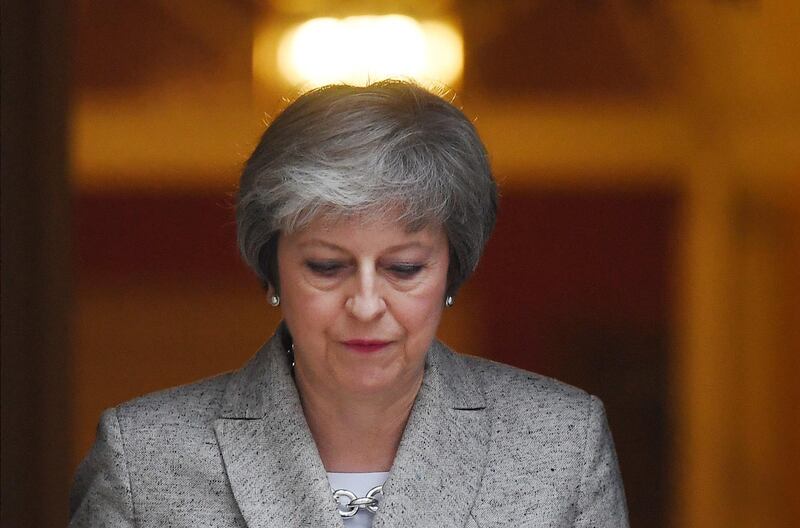When Pandora opened her box and unleashed a host of evils upon the world, all that was left inside her empty vessel was hope.
Throughout history, she has been the ultimate anti-hero and a pawn of circumstance, yet she also represented the last chance of salvation from misery.
It is tempting to see Theresa May as a modern-day Pandora. The Brexit deal she hopes to get endorsed tomorrow by the leaders of 28 nations at a critical EU summit in Brussels comes after the ravages of political demons have taken their toll. All she can offer is the hope that her way is better than any other.
Critics have long argued about the concept of hope represented in the Greek myth. Some see it in a positive light, as a bridge to a better future. Others view it as rather more negative, a solace that humans use to soothe anxiety about the present but one that negates the need for improvement or effort.
As with Pandora, Mrs May has reached the moment when she has fulfilled her destiny. Both Remain and Leave loyalists are firmly of the view that the deal is a placatory gesture but ultimately not in the country’s interest.
It would sap British ambitions to be a full and active player either in Europe or on the global stage.
Betting against Mrs May has so far, however, proven a fool's wager. The Conservatives have never truly taken her to their hearts. At the 2002 Conservative party conference, she complained: "Some people call us the nasty party", a moniker that stuck. With dogged but uncharismatic personality traits, her resilience has long been her only redeeming characteristic from a political point of view.
Last year she fought her first general election as leader and lost the Tories' parliamentary majority inherited from David Cameron.
Now she has negotiated a Brexit deal that is opposed by nearly 90 Conservative MPs, more than one-quarter of her 315 party members sitting in Parliament.
The Spectator's political commentator James Forsyth points out that the problem with the deal is that it pits two cherished principles of the Conservative party against one another.
By agreeing to the so-called backstop that maintains a customs union and close economic regulatory alignment with the EU, Mrs May is setting Britain up for an infringement of its sovereignty. However, if that compact is ever discarded, it would come at the expense of separating the Northern Ireland economy from the UK's, which is a threat to the second principle, that of upholding the union.
The result is that the bitter feuding in the Conservatives is getting worse. Yet the disaffected cannot strike to remove her. Mrs May endures because party rules state that if she won a vote of no confidence, she could not be challenged for another year.
The Daily Mail's political commentator Quentin Letts has highlighted the paradox of her position. Writing in Politico, Mr Letts said Mrs May's career would be over as soon as she secured Parliament's backing for the Brussels deal. The Conservatives, he wrote, would strike "as fast as a cobra".
Mrs May could still face an internal challenge, even while trying to persuade Brussels of the merits of her deal. After this weekend's EU summit, she still has to persuade Parliament to back the agreement. And if she gets through that hurdle, the deal then has to be ratified by the European Parliament.
Yet given the topsy-turvy nature of Westminster politics, she could still emerge triumphant.
The predicament facing British politics – or at least the ruling party – is the rather daunting alternative prospect of Jeremy Corbyn winning a future general election.
Leaning to the far left, Mr Corbyn would not have to be prime minister for very long to radically change Britain. Quite aside from his economic agenda, Mr Corbyn would rip up military and intelligence alliances that could not be put back together in a hurry.
Mrs May’s weaknesses as a politician have been ruthlessly exposed by Brexit. Every week that has passed since she came to power has been a demonstration of a new facet of inadequacy in her make-up. Resilience is the last asset she realistically holds.
Yet she is still there. As she stands pressing the flesh in Brussels this weekend, she has reached the point of departure she sought for Britain.
Her handpicked attorney general Geoffrey Cox has reportedly described the agreement in graphic terms as a "life raft" made from "oil drums and a plastic sail" that threatens to fall apart as it thrusts forward into the open ocean.
Mrs May is now lashed to the mast. As it creaks and groans, it is a fair assumption she will stretch every political sinew to keep it afloat. Her strategy to sell the deal is to field every hostile question possible from Parliament and the media with her mantra that she has struck the best possible compromise.
The question remains whether she will emerge an anti-hero who will be forgiven her faux pas – and indeed, if the deal somehow passes and stands the test of time, whether she will be vindicated in the eyes of future generations.





